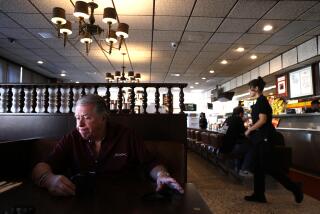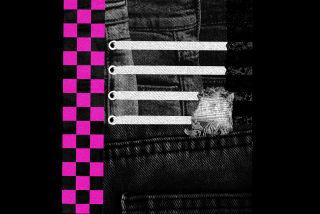Actor Urges Ban on Sales of Gang Wear
- Share via
MOORPARK — Perhaps best known for his role as the hapless Delta pledge Flounder in the 1978 movie “Animal House,” actor Stephen Furst stepped into a different kind of limelight Wednesday, urging the City Council to ban the sale of gang- and drug-related clothing near schools.
“It’s just wrong that stores sell this stuff to kids,” said Furst, a Moorpark father who also appeared on the television shows “St. Elsewhere” and “Babylon 5” and has worked as a volunteer youth counselor at juvenile detention facilities. “Drugs and gangs take ambitious children and turn them into failures, and stores that sell this kind of stuff are just helping that.”
Speaking during a public comment period at the meeting, Furst, whose real last name is Feuerstein, asked the council to adopt an ordinance that would prohibit retailers located near schools from selling clothing that includes drug and gang messages.
Council members promised to look into the idea, although they noted that such a law could conflict with the 1st Amendment.
“I understand what kind of problems are involved in getting [an ordinance] like this put together, but I’m not against moving forward on this,” Councilman Chris Evans said. “If it’s a concern for a member of our community, then it’s a concern for us on the council.”
During the meeting, City Manager Steve Kueny and Sheriff’s Capt. Mike Lewis said they would research ordinances that other cities may have on the issue.
*
Furst, who has had friends such as John Belushi and Chris Farley overdose on deadly mixtures of drugs, said he became incensed after visiting the Family Sportswear store in Moorpark to have a jacket embroidered for his 16-year-old son.
There he saw black-and-white baseball caps, as well as other clothing, emblazoned with images of bright green marijuana leaves. Other caps and shirts were sporting numbers referring to street gangs.
“It got me angry that they were selling this stuff to kids,” Furst said.
He called the store’s owner, Jun Lee, and asked that the merchandise be removed, even threatening to hold a loud protest outside the store to call attention to the issue.
Lee, who also owns the Pants Town clothing store in Thousand Oaks, agreed to remove the merchandise and said he has thrown it away, losing a couple of hundred dollars.
“I understood what he was trying to do. I mean, I have kids too,” said Lee, a Korean immigrant who added that he wasn’t aware of the meaning of the messages on the merchandise. “I took it all down, and we’re not going to sell it anymore.”
Though Furst won his point with the store, his drive to get the city to adopt an ordinance will be harder.
*
Peter Eliasberg, an attorney at the American Civil Liberties Union in Los Angeles, said such an ordinance would immediately be rejected by a court for violating free-speech provisions of the Constitution.
“These kinds of initiatives always fail because they are so blatantly unconstitutional,” Eliasberg said. “Government . . . cannot pass laws that limit speech based solely upon content, which this seems to be trying to do.”
In a number of precedent-setting Supreme Court cases dating to the early part of the century, justices have determined that clothing could be considered a medium that relays an opinion, much like a pamphlet or magazine.
*
Additionally, he said, an ordinance seeking to ban only certain types of merchandise--types that include messages about drug abuse or gangs--would be punishing a certain kind of speech.
“The only way an ordinance like this would work would be for the city to prohibit the sale of all clothes, rather than just a certain type,” Eliasberg said. “And I don’t think that’s something they’d be willing to do.”
Despite such sticky questions, Furst said an ordinance is needed to help keep Moorpark’s reputation as a sleepy little bedroom community from being tarnished.
“I think the community needs to do something before the problem’s too big to handle,” he said. “I know about the problems involved with this, but I think it’s in the city’s and children’s best interest.”
More to Read
Sign up for Essential California
The most important California stories and recommendations in your inbox every morning.
You may occasionally receive promotional content from the Los Angeles Times.













